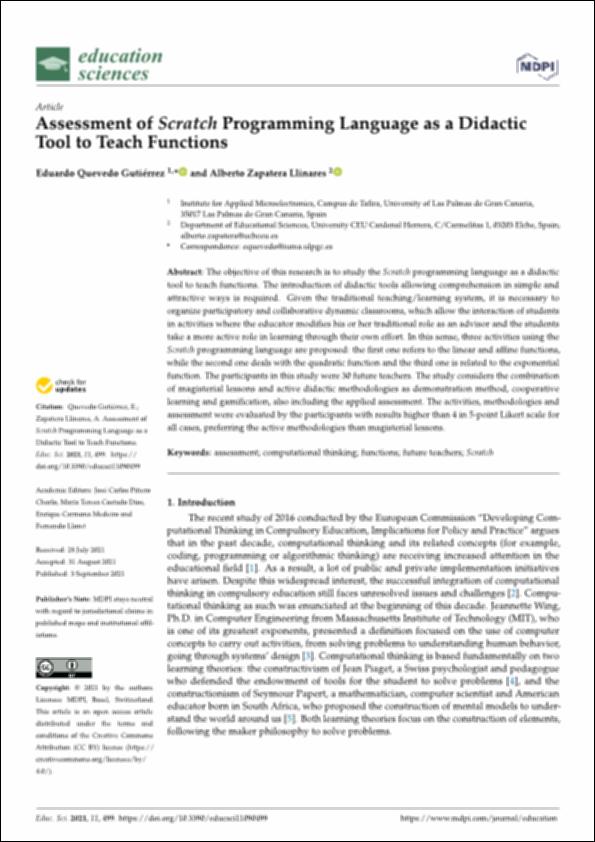Por favor, use este identificador para citar o enlazar este ítem:
http://hdl.handle.net/10637/13642Assessment of Scratch programming language as a didactic tool to teach functions
| Título : | Assessment of Scratch programming language as a didactic tool to teach functions |
| Autor : | Quevedo Gutiérrez, Eduardo Zapatera Llinares, Alberto |
| Materias: | Funciones (Matemáticas) - Didáctica.; Informática - Aplicaciones en matemáticas.; Functions - Study and teaching.; Scratch (Computer program language); Matemáticas - Didáctica.; Mathematics - Study and teaching.; Scratch (Lenguaje de programación); Computer science in mathematics. |
| Editorial : | MDPI |
| Citación : | Quevedo Gutiérrez, E. & Zapatera Llinares, A. (2021). Assessment of Scratch programming language as a didactic tool to teach functions. Education Sciences, vol. 11, i. 9 (03 sep.), art. 499. DOI: http://dx.doi.org/10.3390/educsci11090499 |
| Resumen : | The objective of this research is to study the Scratch programming language as a didactic tool to teach functions. The introduction of didactic tools allowing comprehension in simple and attractive ways is required. Given the traditional teaching/learning system, it is necessary to organize participatory and collaborative dynamic classrooms, which allow the interaction of students in activities where the educator modifies his or her traditional role as an advisor and the students take a more active role in learning through their own effort. In this sense, three activities using the Scratch programming language are proposed: the first one refers to the linear and affine functions, while the second one deals with the quadratic function and the third one is related to the exponential function. The participants in this study were 30 future teachers. The study considers the combination of magisterial lessons and active didactic methodologies as demonstration method, cooperative learning and gamification, also including the applied assessment. The activities, methodologies and assessment were evaluated by the participants with results higher than 4 in 5-point Likert scale for all cases, preferring the active methodologies than magisterial lessons. |
| Descripción : | Este artículo se encuentra disponible en la siguiente URL: https://www.mdpi.com/2227-7102/11/9/499 Este artículo pertenece al número especial "Trends on Educational Gamification: Challenges and Learning Opportunities". |
| URI : | http://hdl.handle.net/10637/13642 |
| Derechos: | http://creativecommons.org/licenses/by/4.0/deed.es |
| ISSN : | 2227-7102 (Electrónico) |
| Fecha de publicación : | 3-sep-2021 |
| Centro : | Universidad Cardenal Herrera-CEU |
| Aparece en las colecciones: | Dpto. Ciencias de la Educación |
Los ítems de DSpace están protegidos por copyright, con todos los derechos reservados, a menos que se indique lo contrario.


